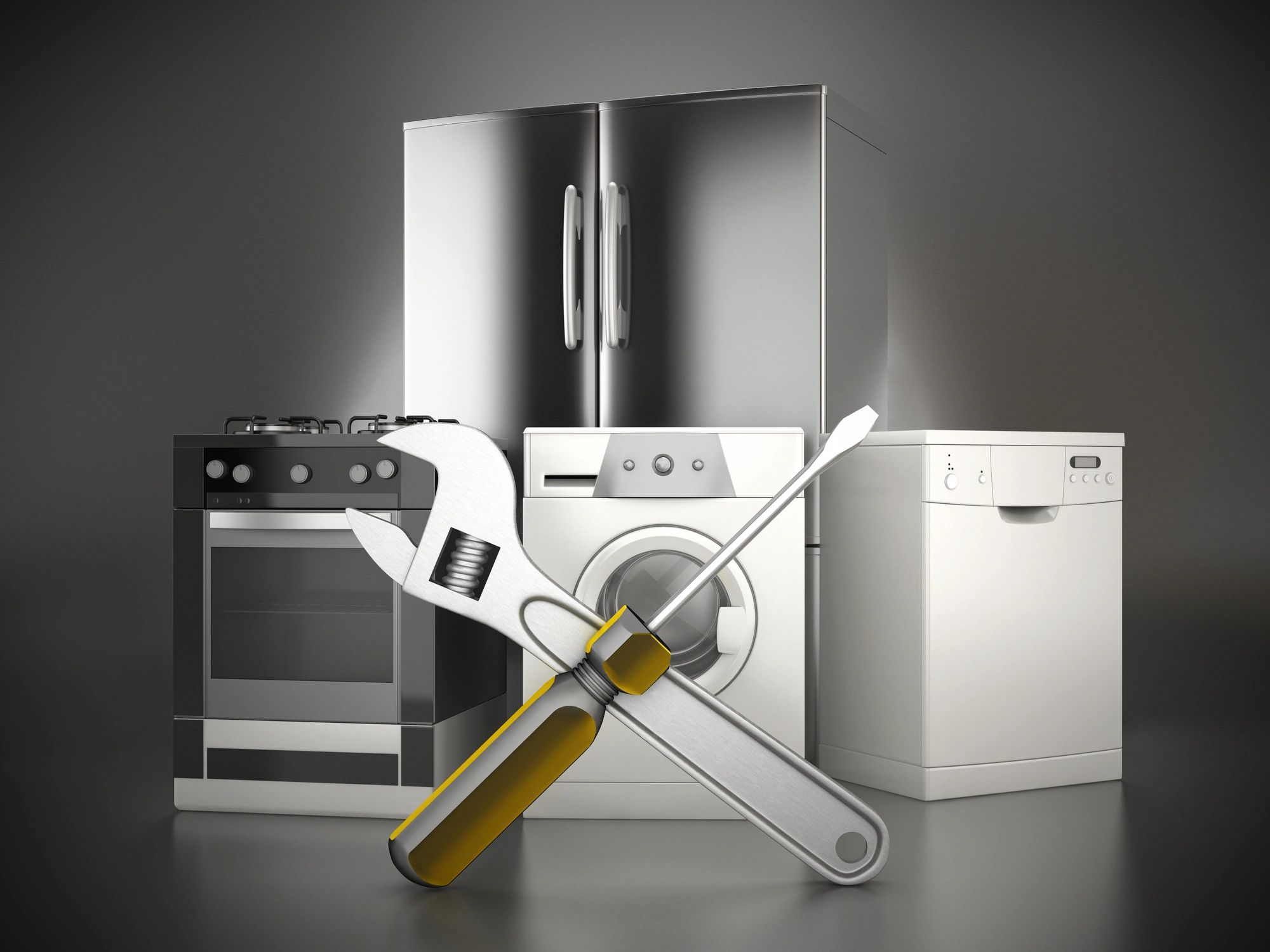The Ultimate Guide to Comprehending Appliance Repair Service at Home
When your refrigerator quits cooling or your oven declines to heat, it can feel overwhelming. Understanding home appliance repair in your home can save you money and time. You'll discover to recognize symptoms, use vital devices, and adhere to a systematic troubleshooting process. Before you begin, there are critical safety preventative measures you require to take right into account. What are one of the most common problems, and exactly how can you fix them? Allow's check out the basics.
Common Device Issues and Their Signs
When your appliances begin acting up, it's necessary to recognize the indications at an early stage. Disregarding them can cause larger issues and pricey fixings. If your refrigerator isn't cooling properly, you might see warm spots or condensation creating. This can suggest a falling short compressor or an obstructed vent.Your dishwashing machine may show problems with unclean dishes or uncommon sounds throughout cycles. If you hear grinding or clanking, it's time to investigate.A cleaning machine that will not rotate or drain pipes can leave you with soaked washing, recommending a clogged up drain or a malfunctioning pump.Lastly, if your oven's temperature level seems off or it takes forever to preheat, you might be dealing with a defective thermostat. By remaining sharp to these signs and symptoms, you can address issues prior to they intensify right into significant fixings.
Essential Tools for Device Repair Work
When you're dealing with appliance repairs in your home, having the right devices is necessary. Basic hand tools like screwdrivers and pliers will certainly aid you take apart and take care of various devices, while electric screening gadgets ensure you're functioning safely with wiring. Let's discuss what you require to get started on your repair journey.
Fundamental Hand Tools
Having the right devices is essential for reliable device repair work in your home. Begin with a trusted screwdriver collection, including both flathead and Phillips kinds, as screws prevail in home appliance setting up. Pliers are likewise vital; they assist with gripping, turning, and reducing cables or little parts. A pair of needle-nose pliers can get to difficult situations conveniently. You'll need a great adjustable wrench for tightening or loosening nuts and screws. An utility blade is helpful for puncturing product packaging or insulation. Do not forget a strong workbench or surface area to securely arrange your devices and parts. With these fundamental hand tools, you'll be well-prepared to tackle most appliance repairs that come your way.
Electrical Screening Tools
Together with basic hand devices, electrical screening tools play a vital role in home appliance repair service. These devices help you diagnose electrical problems and assurance devices operate safely. A multimeter is important; it measures voltage, current, and resistance, enabling you to pinpoint troubles swiftly. A non-contact voltage tester is another must-have, letting you detect live wires without making direct get in touch with, improving your safety and security. Clamp meters are fantastic for measuring current flow in cables without separating them, saving you time and initiative. In addition, circuit testers can rapidly inspect if outlets are working appropriately. By utilizing these devices, you'll enhance your troubleshooting process and improve your repair work skills, making device upkeep a lot simpler.
Step-by-Step Overview to Diagnosing Appliance Issues
When your home appliance acts up, it can be aggravating, yet diagnosing the problem doesn't have to be overwhelming. You'll learn to identify typical issues and use effective troubleshooting methods. Allow's go through the actions to obtain your device back in working order.
Usual Appliance Problems

Troubleshooting Methods Clarified

Repairing Significant Kitchen Area Home Appliances: A Closer Look
Have you ever before questioned exactly how to tackle usual issues with your kitchen area appliances? Repairing significant cooking area appliances like fridges, stoves, and dishwashing machines can be less complicated than you assume. Begin by recognizing the trouble-- whether it's a refrigerator not cooling down or an oven that will not heat. Typically, an easy reset or checking the source of power can solve the issue.For refrigerators, clean the condenser coils and check the door seals. If your oven's not heating, examine the burner and thermostat. Dishwashing machines might just require a clean filter or a reset to get them back in action. Always disconnect the home appliance prior to diving right into repairs to ensure your safety.Don' t fail to remember to get in touch with the customer guidebook for specific repairing pointers connected to your version. With a little bit of perseverance and the right tools, you can confidently take on home appliance fixings and save cash while doing so!

Repairing Laundry Devices: Tips and Techniques
When your washing home appliances begin breaking down, it can feel frustrating, but repairing them doesn't need to be a headache. Beginning by inspecting the power supply. Verify the appliance is connected in and the electrical outlet is functioning. Next, check the door or cover button; a faulty switch can stop the machine from operating.For washers, if it's not rotating, examine for unbalanced tons. Redistributing the clothing might solve the problem. If your dryer isn't heating, clean the lint filter and examine the air vent for blockages.Listen for uncommon sounds; they can show an issue. If your appliance is leaking, check the hoses for splits or loosened connections. Record any kind of error codes displayed on electronic screens, as they can assist you in recognizing the concern. Lastly, speak with the whirlpool dryer belt replacement user handbook for certain fixing tips associated with your model.
Security Preventative Measures to Take Throughout Services
Before you start any home appliance repairs, it's important to focus on security to stop mishaps or injuries. Disconnect the device or turn off the circuit breaker to ensure no power reaches it while you work. Use shielded tools to lessen the danger of electric shock. Put on safety goggles and handwear covers to protect yourself from sharp sides or debris (Kenmore Dryer Repair Oro Valley Dependable Refrigeration & Appliance Repair Service).Make certain your work area is neat and well-lit, so you can see what you're doing. Maintain kids and pets away from the location to stay clear of distractions and possible threats. If you're dealing with gas devices, be additional cautious; look for leaks before proceeding.Take your time, and do not rush with repair services. If you really feel unpredictable concerning any action, it's better to stop briefly and research than to presume. Following these safety measures will certainly aid produce a more secure setting for your do it yourself home appliance fixing job
When to Call a Specialist for Help
How do you understand if it's time to employ a professional for home appliance repairs? If you've attempted standard troubleshooting without success, it's a clear sign. If your home appliance still won't begin or shows unusual sounds after resetting it, do not be reluctant to seek specialist help.When you discover leakages, smoke, or melting smells, prioritize security and call a pro quickly. These problems can bring about even more substantial damages or present threats to your home.Also, if your device is under service warranty, speaking to a specialist is commonly the very best course. They can assure that repair services won't invalidate your service warranty, conserving you money in the long run.Finally, if you're unsure or awkward with complex repairs, it's wise to leave it to the specialists. Keep in mind, taking on complex problems without the appropriate experience can lead to costly errors. Count on a professional when unsure!
Often Asked Concerns
How Can I Protect Against Home Appliance Issues in the Future?
To stop home appliance troubles in the future, you need to carry out regular maintenance, look for damage, tidy filters, and prevent overloading. Remaining proactive will assist prolong their additional hints life-span and keep them running efficiently.
What Are one of the most Usual Do It Yourself Appliance Repair Mistakes?
You could overlook security preventative measures, avoid repairing steps, or use wrong tools when attempting DIY appliance repair work. Hurrying the process or disregarding producer guidelines can result in even more significant problems and expensive mistakes. Stay patient and notified!
Exactly how Do I Know if a Part Needs Replacement?
You can inform if a component requires replacement by checking for uncommon noises, leaks, or inconsistent performance. If the home appliance struggles to run appropriately or reveals visible damage, it's most likely time for a substitute.
Can I Use Generic Components for Appliance Services?
Yes, you can use common parts for device fixings, yet establish they're compatible - Dependable Refrigeration & Appliance Repair Service Washing Machine Repair. Common parts could conserve you money, yet they might impact efficiency or longevity, so weigh your alternatives thoroughly before choosing
What Guarantees Cover Device Fixes?
A lot of appliance guarantees cover fixings for manufacturing flaws, yet they usually exclude damage from abuse. Examine your warranty terms thoroughly, as some could need making use of certified specialists and initial components for protection to stay valid.